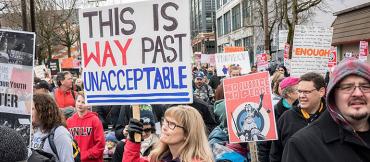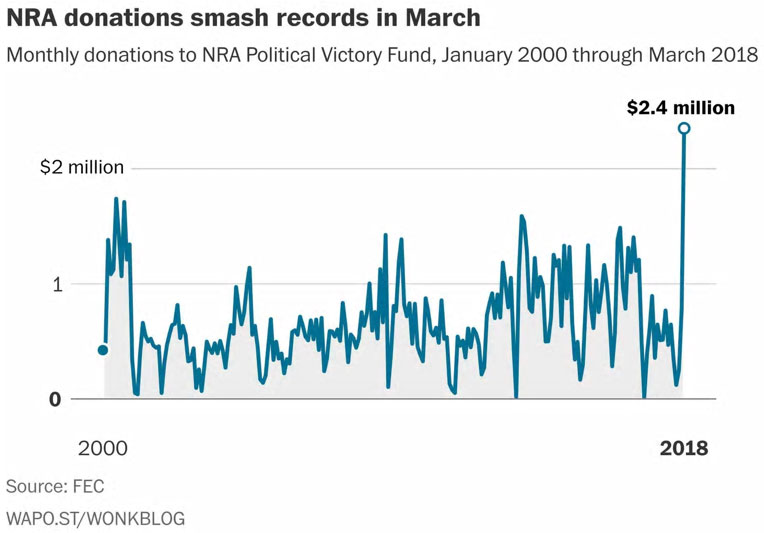
In the wake of the February mass shooting at Marjory Stoneman Douglas High School, we have been treated to a near-constant barrage of media coverage about the anti-gun movement. But has all that airtime been effective? Has it dissuaded Americans from gun ownership, resulted in changed laws and changed hearts and minds?
Certainly a few groups and causes have sprung up since the shooting, particularly with the influx of Hollywood celebrity donations in the immediate aftermath -- March For Our Lives, The National School Walkout, #NeverAgain -- which garnered support from existing anti-gun organizations such as Everytown, Moms Demand, and The Brady Campaign. Along with those were prominent speakers from the school, students David Hogg and Emma González being primary among guests on news networks. The term “The Parkland students” became a metonym for the gun control movement.
Yet, for all the media support, there has not been a tectonic shift in general-public opinion on guns. There have been excited reports on numerous new gun laws passed in states since February, but many of these are incremental changes (tightening of background checks, banning of bump-stocks) or they were the denial of bills loosening restrictions. Eleven states failed to pass laws that allowed concealed-carry without a permit; these are counted as gun control “wins.”
But as far as changing minds in large numbers, the major influence is seen on the opposite side of the debate.
While the press has favored gun control, and therefore report eagerly on any progress on that front, they have been less diligent on noting the pro-gun advances. This is because the numbers displaying support disrupts the narrative of changing the public perception.
As I recently wrote, the heavily media-hyped book from David and Lauren Hogg has been suffering dismal sales figures. Another example typifying this one-sided reporting is in fundraising. We had heard plenty about how much financial support the various anti-groups were receiving. Yet in the month of March the NRA experienced a surge of support, so much that donations to the Second Amendment lobbying organization exceeded those of the gun control groups.
For all the talk that David Hogg and the Parkland kids are having a huge influence, the NRA enjoyed record-setting donations in March. The organization collected nearly $2.4 million as a direct result of their messaging. In fact the following month of April was also the highest total of donations for the group in that month, as was May. A number of companies suspended partnerships with the NRA under pressure from the gun control lobby, and those promptly saw the NRA membership swell following their departure.

But the non-profit fundraising is not the only barometer of public opinion on the subject. If minds were being swayed across the country regarding guns it is not being reflected in the marketplace. Since the Parkland student activism was launched their goal of fewer guns has had the opposite of the desired effect.
While exact gun sales figures are not made available, there is a way of measuring that purchasing power. The FBI tabulates gun purchase background check data. In the past three months there has been a demonstrable spike in those applications. However, they give an incomplete picture of probable higher figures, as a single application could apply to the purchase of multiple guns.
It was with an amusing level of obliviousness that in April David Hogg began to encourage a boycott request on investment firms Vanguard, and Black Rock. The reasoning? The investment management companies have holdings in gun manufacturers. This means Hogg was recommending the groups drop businesses that were enjoying a surge in business as a direct result of his activism -- he wanted investors to sell off properties experiencing sales growth that he spurred. At Vanguard, they even noted that as they provided index funds that exclude firearms companies, they saw no appreciable growth in interest for those products.
Likewise, Hogg spearheaded a widely reported boycott of Fox News personality Laura Ingraham. While a number of advertisers did in fact pull out of promoting her program they eventually ended up shooting themselves in the foot -- so to speak. In the weeks following the controversy Ingraham saw significant growth in her audience over the preceding weeks. This was not a brief mushrooming in numbers due to curiosity; last month she enjoyed her highest ratings ever for the program.
Looked at statically, any of these indicators could be seen as interpretational. But taken in whole there is a clear indication that the perceived influence of the groups and individuals involved in the Parkland advocacy set have had an effect that settles somewhere between “muted”, to “negative impact”. Despite the press selling us on the successes of these movements the actual numbers reveal a populace that has yet to react in the way we are told we are reacting.
Brad Slager is a Fort Lauderdale freelance writer who wrote this story exclusively for Sunshine State News. He writes on politics and the entertainment industry and his stories appear in such publications as RedState and The Federalist.
READ MORE FROM SUNSHINE STATE NEWS
David Hogg’s Hyped Book Hit the Market with a Thud
Don’t Believe What Pollsters Say about the Gun Control Views of NRA Members


